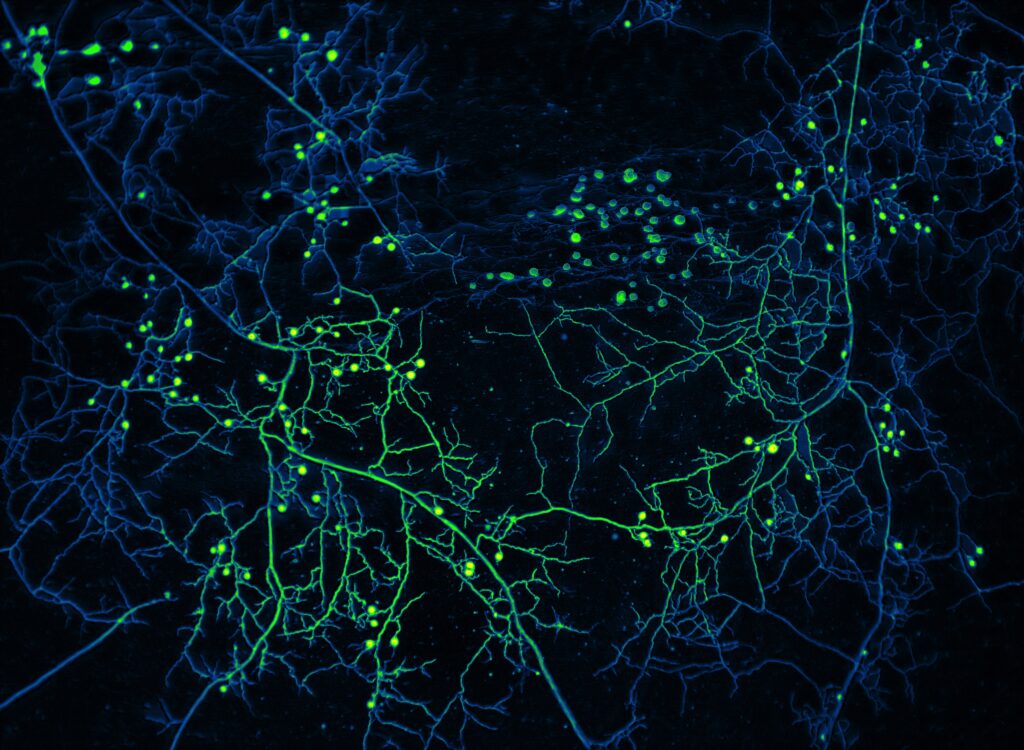The Schmidt Family Foundation is excited to deepen its commitment to restoring balance between people and planet through a $3M grant to the Society for the Protection of Underground Networks (SPUN). The Foundation joins as a founding partner of the fungus-focused nonprofit, which is dedicated to tackling climate change through the mapping and protection of mycorrhizal fungi. Their mission, combined with the principles on which their work is centered – scientific rigor, open data, and inclusive action – are breathing new life into an underfunded (and vastly underestimated) realm of underground ecosystem research.
“Without fungi, there would be no life on Earth. But climate change is putting fungal systems—and with them all our ecosystems, not to mention the foundations of all agriculture—at increasing risk,” said Wendy Schmidt, co-founder and president of the Schmidt Family Foundation. “The dedicated scientists of SPUN recognize that to protect fungal networks, we need to bring them into a clearer focus and to understand the crucial role they play in cleaning our air, creating our food and making life itself possible.”
Despite being just a year old, SPUN is already bringing considerable buzz and attention to the little-known but dizzyingly vast mycorrhizal networks; publications such as Fast Company, Science Magazine, and The New York Times have taken note of the work that cofounder Toby Kiers and her team are doing, effectively popularizing a critical piece of the climate crisis puzzle. Donning trademark blue jumpsuits with the words, “PROTECT THE UNDERGROUND,” the team, made up of evolutionary biologists, data scientists, mycologists, and ecologists, has become the unofficial defenders of the invisible fungal networks, called mycorrhizal fungi, that form a trade symbiosis with nearly all plant species on earth. In essence, these fungal “super-highways” – which span roughly 450 quadrillion kilometers, or around half the width of our galaxy – facilitate nutrition, pathogen protection, heavy metal tolerance, and water uptake in soil and plants. While the biological infrastructures and exchanges are exceedingly complex and invisible to the naked eye, the fact remains that the more we learn about mycorrhizal networks, the more obvious it becomes that they play an invaluable role in the health of our biodiversity.

Credit: Dr. Loreto Oyarte Galvez
For SPUN, mapping these networks into a global database of mycorrhizal diversity is the best way to understand and prioritize the protection of these networks, and the organization’s Underground Explorers Program, a collaboration with local researchers and communities across the world, allows them to do just that. In keeping with their “inclusive action” principle, SPUN’s website also provides for people of all ages and knowledge levels to get involved in the work, including SPUN Youth and the Fauna Flora Fungi initiative, which you can sign here.
“SPUN is not only elevating the important role fungal networks play throughout our ecology, but also centering local communities along the way,” said Joe Sciortino, executive director of The Schmidt Family Foundation. “We couldn’t be prouder to support an organization that believes in and advocates for information as a shared commons, especially when it will help local communities build climate resilience.”
SPUN plans to use the grant from The Schmidt Family Foundation to continue to build out its organizational infrastructure and bring more founding partners onboard. Their main priority will continue to be raising awareness of the importance of fungal networks to the resilience and sustainability of our ecosystems, and we couldn’t be more thrilled to be a part of these efforts.
Read the press release for more on the grant and follow SPUN on Instagram and Twitter for the latest developments.